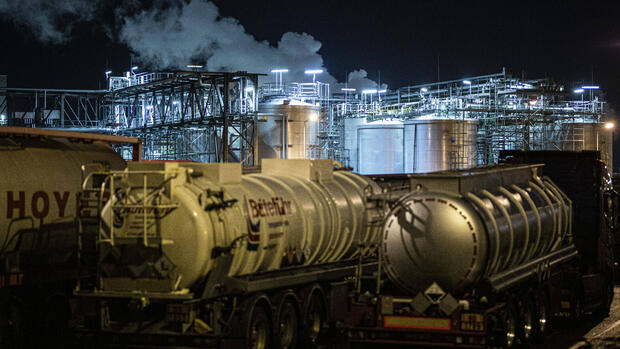The chemical industry accounts for around nine percent of energy consumption in Germany.
(Photo: imago images/photothek)
Berlin On the way to climate neutrality, the chemical industry will have to focus more than before on recycling and the use of renewable raw materials. This is the result of a study by the think tank Agora Energiewende, which is available to the Handelsblatt. Frank Peter, Industry Director at Agora Energiewende, told Handelsblatt that the use of renewable hydrogen and electrification will play an important role for the industry. This is also reflected in the policy decisions. “But that alone will not be enough. We also need renewable raw materials and a much better recycling of products so that the transformation of the chemical industry succeeds.”
The authors call on politicians to force this process through appropriate regulation. “The federal government is responsible for quickly creating the regulatory framework for a climate-neutral chemical industry and thus strengthening competitiveness and innovative strength,” said Peter.
Natural gas is the starting point for basic chemicals
The chemical industry accounts for around nine percent of energy consumption in Germany. The most important energy sources in the industry are natural gas and electricity. According to industry information, the industry’s share of electricity consumption in Germany was 10.6 percent in 2021. This corresponds to an electricity volume of 53 terawatt hours.
However, chemical companies do not only need natural gas to produce electricity and heat. At the same time, natural gas is an important raw material for the production of basic chemicals. Raw materials, in turn, are the starting point for the production of plastics, fertilizers, paints, adhesives or preservatives. Renewable raw materials such as vegetable oils, on the other hand, have so far made up a small proportion of the raw material base in the industry at around 13 percent.
The sharp increase in demand for electricity is reaching its limits
According to the Agora study, this has to change: “So far, the federal government has not sufficiently addressed the issues of renewable raw materials and the circular economy,” said Peter. “It is clear that additional regulation is required, for example to use plastic waste as a resource better than before and to develop renewable sources of raw materials. However, concrete instruments still have to be worked out.”
So far, green hydrogen in particular has played a decisive role in the considerations of politics and the chemical industry. Hydrogen, obtained by electrolysis from renewable energies, is intended to replace natural gas as a raw material. According to its own statements, the industry will need eleven times more electricity in the future than it does today in order to be able to operate in a climate-neutral manner. An annual electricity volume of more than 600 terawatt hours is required.
In contrast to the situation today, 100 percent of the electricity should come from green sources if possible. Other sectors, such as the steel industry, are also reporting a high demand for green electricity and green hydrogen. Doubts about the feasibility are spreading in view of the great demand and the limited supply so far.
>> Read here: Gas could remain scarce for years
Alternatives to green electricity and green hydrogen are becoming all the more important. “With the material use of sustainable biomass, the demand for renewable hydrogen and electricity in the chemical industry can be significantly limited. This is urgently needed to replace the fossil raw material base,” said Agora director Peter.
The public debate is mainly about banning carbon dioxide from the process chains. “But we will still need carbon as a raw material in the future,” he predicted, referring to naphtha as an example, a by-product from refinery processes in the mineral oil industry and at the same time an important starting material for manufacturing plastics.
However, naphtha as a by-product of refinery processes is expected to disappear in the foreseeable future because the consumption of gasoline and diesel will decrease. “For this we need substitutes from raw material sources such as biomass or waste.”
More: Brussels rejects federal government plans for new gas-fired power plants

